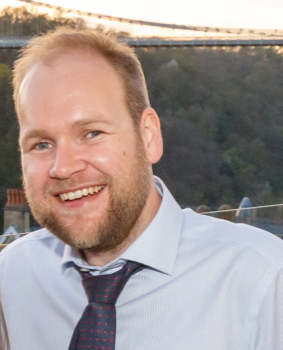Michael Dicker (2012 cohort)
 Please provide a brief summary of your PhD project.
Please provide a brief summary of your PhD project.
My PhD explored the use of light and chemistry to both power and control the movement of different devices and structures. While light and chemistry are often employed in the Natural world, they are rarely applied in engineered systems.
Did you choose to continue your XP project as a PhD? Why or why not?
This was a continuation of my XP, while I was open to the prospect of changing topics, my XP research had raised some really interesting questions which I was keen to try and answer in the PhD.
How did the taught component benefit your PhD research?
The taught component was hugely beneficial. The research I undertook was very different to what I had under taken prior, such that I simply couldn't have done it without the wide breadth of subjects that I was exposed to from the different taught components.
How did the cohort structure benefit your PhD research?
In a similar way that the wide range subjects offered in the taught component is valuable, so is the wide background of the different members of the cohort, who are always available to help in their own area of specialisation. This on top of having a group of people that can directly relate to the wider challenges of a PhD was really fantastic.
What did you most value about being part of a CDT?
For me the most valuable part of the CDT was the environment that was created and the resources and connections that are provided to allow for uncompromised research into your chosen area of study.
What was the 'impact' of your research?
Although my research was and remains very 'blue-sky', it has now contributed to a number of high impact papers as well as successful grant and fellowship proposals. Clearly people are excited by the topic, with its potential in such emerging fields as human safe soft robotics only just beginning to be recognised.
What was your destination on leaving the CDT?
Research Associate at the Bristol Composites Institute (ACCIS).
What are your main responsibilities?
I'm very much continuing with PhD research. My current project is funded until March 2018, and I have now secured a three year Leverhulme Trust Early Career Fellowship to follow this. The big difference from the PhD is that I now supervise my own research students.
Where do you see yourself in five to ten years' time?
Possibly still in academia, or perhaps commercialising different aspects of my research through a spin-out company.
How have the skills and knowledge you acquired during your time in the CDT helped develop your career?
I use skills from the CDT all the time, for example in applying for research funding I directly apply the lessons learned from the taught component on writing grant proposals.
